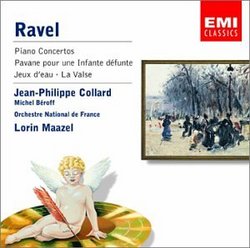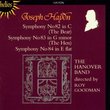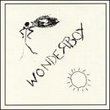| All Artists: Maurice Ravel, Lorin Maazel, Orchestre National de France, Jean-Philippe Collard, Michel Beroff Title: Ravel: Piano Concertos; Pavane pour une infante défunte; Jeux d'eau; La valse Members Wishing: 0 Total Copies: 0 Label: EMI Classics Release Date: 1/7/2003 Genre: Classical Styles: Forms & Genres, Concertos, Symphonies Number of Discs: 1 SwapaCD Credits: 1 UPC: 724357474924 |
Search - Maurice Ravel, Lorin Maazel, Orchestre National de France :: Ravel: Piano Concertos; Pavane pour une infante défunte; Jeux d'eau; La valse
 | Maurice Ravel, Lorin Maazel, Orchestre National de France Ravel: Piano Concertos; Pavane pour une infante défunte; Jeux d'eau; La valse Genre: Classical
|
Larger Image |
CD DetailsSimilar CDs
|
CD ReviewsMasterful Performances of Essential Ravel Charles Loffredo | New York, NY United States | 02/01/2003 (4 out of 5 stars) "Winner of the 1980 Gramophone Award for best concerto, this recording richly deserves the honor. Collard plays the two concerti with virtuostic magnificence, imbuing them with the alternating buoyant jollity and emotional sensitivity required of these idiosyncratic pieces. The adagio of the Concerto in G is particularly arresting in its delicate luminescence. The balance of the disk is comprised of familiar solo piano works, gorgeously rendered, including the four-hand version of La Valse (fascinating if you only know the orchestral). The analog sound quality of the concerti is lush and vibrant, whereas the solo pieces are a bit dry by modern standards. Considering the budget price tag, this is a winning recording." Elegant, very French Ravel at a bargain price--plus a Gramop Santa Fe Listener | Santa Fe, NM USA | 06/10/2006 (4 out of 5 stars) "Jean-Philippe Collard's recording career was largely with French labels (French EMI, Pathe-Marconi), and unitl now I'd never heard him. This budget reissue is highlighted by performances of the two Ravel piano concertos that won a Gramophone Award in 1980. One can hear why: Collard is to the manner born, never resorting to excess, prefectly blending into Ravel's jazzy-soigne idiom for the G major. But he has plenty of power for the Left-Hand Concerto, the more difficult work to bring off, and his reading is totally convincing. In both works he's aided by Maazel, who seems to be at his best in French music. I am less enthusiastic about the two solo works, both done in a strightforward, rather faceless way where what you want is lots of panache and personality from the painist. The CD ends with a two-piano arrangement of La Valse, with Michel Beroff presumably on second piaano. It's rare to hear this arrangement, and since the other works have been recorded brilliantly many times, this brilliant, percussive performance may tilt some buyers in favor of a purchase. Beware EMI's clangy osund, though." The Fourth Star Lost in the Piano Box... C. Pontus T. | SE/Asia | 09/16/2008 (3 out of 5 stars) "Continue reviewing the Ravel Concertos--arguably the greatest twin pair of concertos in the repertoire--I move on from the sleepy Thibaudet/Dutoit (Jean-Yves Thibaudet - Ravel: Piano Concertos, etc.) to clearly more energetically charged territory. Even if Dutoit commonly finds a great deal of the generous myriad of details and atmosphere in Ravel's refined orchestral textures, he is rather much outplayed in this instance by Maazel. The same holds true for Thibaudet vs Collard, where the latter gets so much more out of the music--superior articulation, greater level of energy and a lot more fun--not to speak of the eternal beauty of the G major second movement (yes, Collard almost make you cry!)
The present disc was highly celebrated by the likes of Gramophone, conquering the 1980 Concerto Award. There is no doubt these performances have their merits. One has to give the Gramophone reviewers that the best Ravel Concerto twin couplings were still to come (Zimerman and Lortie). Having said that, the 1968 Argerich G major and 1978 Gavrilov D major were on the market (my personal killer combination, by the way) and clearly score over Collard/Maazel in all aspect except being coupled on the same disc. (Interesting to note is that Gavrilov in fact received the Gramophone Concerto Award two years earlier.) This disc indeed is rather close to the four-star category. Ultimately, the utterly weird sound reproduction tips the scales into the lower category. Weird indeed my trying to describe it may ring, but it actually sounds as though the piano was recorded partly separated from the orchestra--as if in a box or perhaps a nearby undersized room. This problem turns even more serious in the one- and two-piano fillers that sadly are more or less sonically ruined--indeed a pity as they are pianistically quite excellent. As a matter of fact, EMI's Salle Wagram recordings generally end up a level or two below its Abbey Road dittos--this disc just supplies further evidence to this fact." |

 Track Listings (7) - Disc #1
Track Listings (7) - Disc #1

